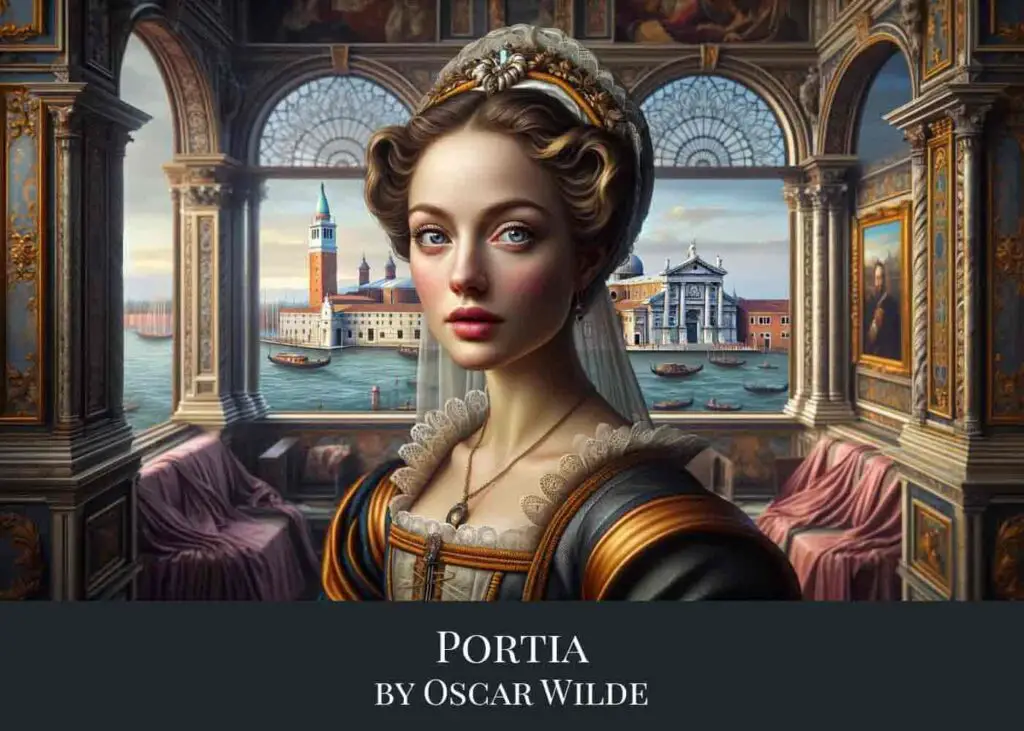
Portia by Oscar Wilde
“Portia” is a poem by Irish writer, poet, and playwright Oscar Wilde, part of his first poetry collection Poems. In this piece, Wilde pays homage to one of Shakespeare’s most renowned characters, Portia, from The Merchant of Venice. The poem reflects on the dual aspects of Portia’s character: her dazzling beauty and her astute wisdom. Wilde masterfully captures the awe inspired by Portia’s appearance in her golden dress, as well as the deep respect for her intellect and legal acumen. The poem’s narrator expresses admiration for Portia’s ability to navigate the complexities of the law to save Antonio, eloquently blending romance with intellectual prowess.
For those intrigued by Wilde’s poetic tribute to Portia, Oscar Wilde’s Poems is available for exploration at PageVio.
1. The Poem
I marvel not Bassanio was so bold
To peril all he had upon the lead,
Or that proud Aragon bent low his head
Or that Morocco’s fiery heart grew cold:
For in that gorgeous dress of beaten gold
Which is more golden than the golden sun
No woman Veronesé looked upon
Was half so fair as thou whom I behold.
Yet fairer when with wisdom as your shield
The sober-suited lawyer’s gown you donned,
And would not let the laws of Venice yield
Antonio’s heart to that accursèd Jew—
O Portia! take my heart: it is thy due:
I think I will not quarrel with the Bond.
Size: 8″ x 12″ (2:3 ratio)
Format: PDF
Copyright information: For personal use only
Note: Actual poster background color is white. For the sample poster, the background is made gray for illustration purpose.
2. Portia Analysis
The poem reflects on the character Portia from William Shakespeare’s play “The Merchant of Venice.” The speaker expresses admiration for Portia, both for her beauty and her wisdom. Let’s break down the poem:
1. The opening lines reference Bassanio, Aragon, and Morocco, characters from “The Merchant of Venice” who are suitors to Portia. They each choose a casket (lead, silver, and gold respectively) in hopes of winning Portia’s hand in marriage. The speaker expresses no surprise that these men were willing to risk so much for the chance to marry Portia, implying her exceptional allure and value.
2. The speaker then describes Portia in her “gorgeous dress of beaten gold,” suggesting she is more radiant than even the sun. This hyperbolic praise of her physical beauty emphasizes her extraordinary attractiveness, surpassing that of any other woman in Verona.
3. The poem shifts to praise Portia’s intellect and character. It references the scene in “The Merchant of Venice” where Portia disguises herself as a male lawyer (“sober-suited lawyer’s gown”). She uses her wisdom and knowledge of the law to save Antonio, a friend of Bassanio, from Shylock, “that accursèd Jew,” who demands a pound of Antonio’s flesh as per their bond.
4. In the final lines, the speaker declares his love for Portia, stating that his heart is rightfully hers due to her combination of beauty and wisdom. The speaker playfully notes that he “will not quarrel with the Bond,” a double entendre referring both to the legal bond in the play and their bond of love for Portia.
The poem pays homage to Portia, celebrating her not only for her physical beauty but more so for her intellect, moral integrity, and the cunning she displays in the play. It underscores the idea that true admiration stems from a combination of external beauty and inner virtues.
3. Conclusion
We trust you found delight in Oscar Wilde’s “Portia,” a poem that elegantly captures the intersection of beauty and intellect, much like its Shakespearean muse. Continue your literary journey with more of Oscar Wilde’s enchanting poems.
